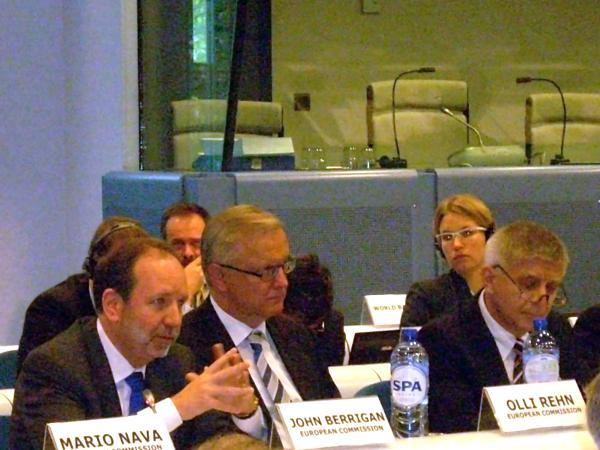
The Vienna 2 Initiative Full Forum met in Brussels on 21-22 October. It assessed recent trends in deleveraging, credit provision, and non-performing loans (NPLs) in the banking sectors of Central, Eastern and South Eastern Europe (CESEE). It discussed the impact of the recently proposed Single Resolution Mechanism for a European banking union on CESEE. A special session highlighted the particular challenges faced by the non-EU countries of South Eastern Europe (SEE).
Twin focus on deleveraging and credit
The reduction of cross-border funding by Western banks for CESEE is continuing at a moderate pace, but with major country differences. A shift to a model relying more on domestic funding is well under way. Meanwhile, credit growth remains slow as a result of supply and demand factors. In view of shallow local capital markets, domestic deposit growth may well prove insufficient to support a meaningful revival of credit growth. In addition, the more selective approach of cross-border banks to the region may pose challenges for some countries—an issue that requires close monitoring. Country-by-country assessment of the main causes behind weak credit growth is important for formulating effective policy responses.
Addressing high NPLs is urgent
Tentative signs of a pickup in credit demand are emerging. Resolving NPLs and regulatory uncertainty are key factors for alleviating current constraints on credit supply.
The Full Forum stressed the urgent need to tackle persistently high NPLs in several countries in the region—thereby also improving frameworks for new lending. For credit to recover, a concerted effort by regulators and banks may be needed to provide the needed incentives and momentum to break the cycle of low growth and high NPLs. The Forum welcomed the publication of the new harmonized definitions of NPLs and regulatory forbearance by the European Banking Authority (EBA). Furthermore, the Forum encouraged their wider use throughout the CESEE region. It also suggested to its bank and regulatory members to jointly design country action plans to tackle NPLs in the most affected countries, including in the context of Host Country Stability Forums. In parallel, Vienna 2 will develop concrete options for possible credit enhancements to spur new credit in particular for small and medium size enterprises. A new working group will deliver proposals by spring 2014.
Impact of the Banking Union on CESEE
The Vienna 2 Initiative noted that a Single Supervisory Mechanism as well as a Single Resolution Mechanism for the European banking union would have profound implications for CESEE. It holds the promise of more effective and better coordinated cross-border bank resolution. The Forum called for strong incentives for opt-ins to ensure as inclusive a membership as possible. It will also be important to develop an effective interface with host countries outside the banking union, including those not being EU members. A Vienna Initiative working group will shortly forward its detailed observations to the relevant European institutions.
Focus on SEE
As a region which is significantly affected by these trends but still remains mostly outside the reach of the EU’s supervisory coordination mechanisms, South Eastern Europe has been designated as a special focus area for Vienna 2.
A second day was dedicated to the particular challenges of this region, focusing on financial stability issues and the impact of the Banking Union proposals. To date four host country-based stability forums have been held under Vienna 2 whose aim was to help assess the cross-border aspects of banking sector stability. Regarding the Banking Union, while most countries are aspiring EU members, accession processes will take some time. Meanwhile the evolving European Banking Union plans do not include opt-in clauses for these countries or any special coordination arrangements. The Forum welcomed the decision of the EBA to re-engage with non-EU countries with regards to supervisory confidentiality assessments. The Forum called for a special regional arrangement for non-EU members on the path toward EU membership on the one hand and the Single Supervisory Mechanism and the EBA on the other.
New Deleveraging and Credit Monitor
The Vienna Initiative will continue to monitor deleveraging and credit trends very closely, which could be affected by the forthcoming asset quality reviews, harmonization of the NPL definition, stress tests of Eurozone banks and the prospective scaling-back of unconventional monetary policy. The Deleveraging Monitor will place added emphasis on credit developments and be renamed Deleveraging and Credit Monitor (DCM). The next DCM will be released on Thursday, 31 October, on which date a conference call will be held.
For more information, visit the Vienna initiative website: http://vienna-initiative.com.

Photographer: EIB ©EBRD - EIB - EU - IMF - World Bank 2012
Download original

Photographer: EIB ©EBRD - EIB - EU - IMF - World Bank 2012
Download original

Photographer: EIB ©EBRD - EIB - EU - IMF - World Bank 2012
Download original